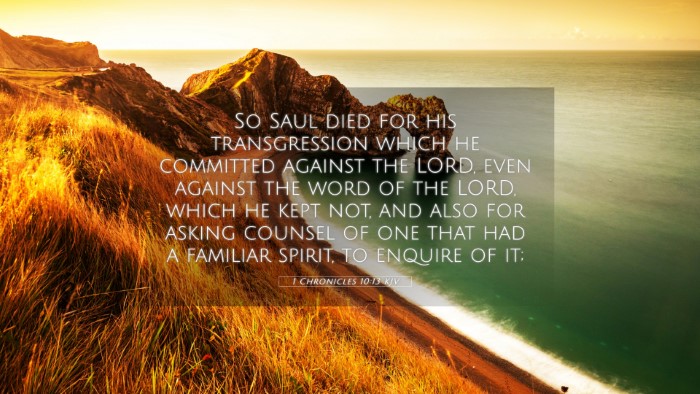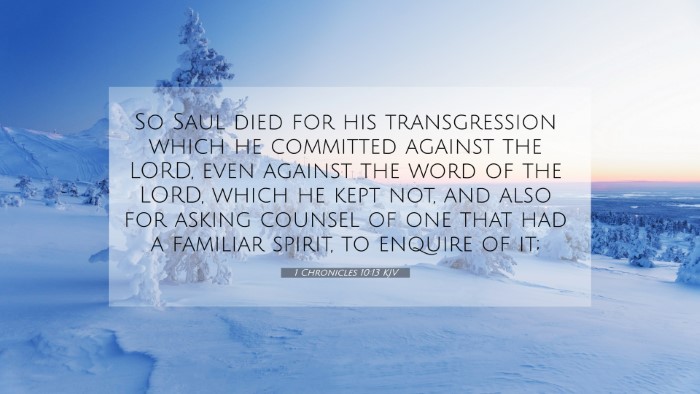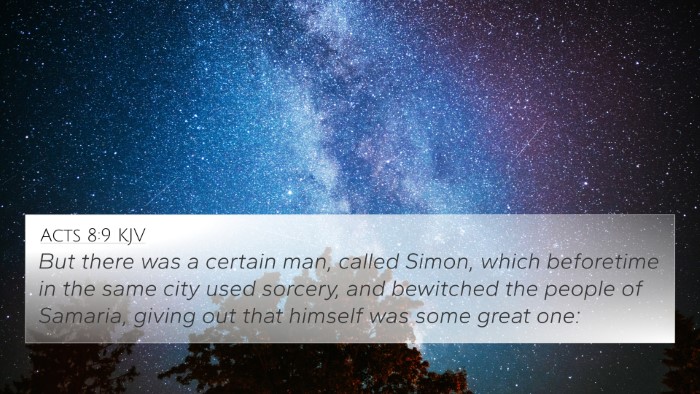Understanding 1 Chronicles 10:13
Verse: "So Saul died for his transgression which he committed against the LORD, even against the word of the LORD which he kept not, and also for asking counsel of one that had a familiar spirit, to inquire of it;"
Summary of Biblical Meaning
The account of Saul's death in 1 Chronicles 10 serves as a sobering reflection on the consequences of disobedience and rejection of God's commands. It underscores the gravity of Saul's sins, particularly his forsaking of the divine instruction and seeking counsel from a medium.
Commentaries on 1 Chronicles 10:13
Insights from Matthew Henry
Matthew Henry emphasizes that Saul's demise is attributed to his transgressions against God. He points out that Saul's actions, specifically in seeking the counsel of a medium, exemplify a departure from faith and trust in God's guidance. Henry also highlights that this was not merely an act of disobedience but a fundamental rejection of God's sovereignty.
Insights from Albert Barnes
Albert Barnes provides a detailed exegesis regarding Saul's disobedience. He notes that Saul’s inquiries to a familiar spirit reveal a desperate state, one where God's silence pushed Saul to seek forbidden avenues. Barnes stresses that Saul's failure to heed God's word led to his downfall, a timeless lesson about the importance of adhering to divine instruction.
Insights from Adam Clarke
Adam Clarke elaborates on the nature of Saul's iniquities. Clarke points out that Saul's consultation with the medium at Endor was particularly grievous in light of his position as king, which carried the responsibility of leading the people in righteousness. Clarke connects this to a broader theme of accountability and the dire consequences of turning away from God, illustrating that leaders are held to even higher standards.
Cross-References and Thematic Connections
1 Chronicles 10:13 can be linked to several other scriptures that explore the themes of disobedience, seeking guidance, and the consequences of sin. Below are some key cross-references:
- 1 Samuel 28:7-20: This passage recounts Saul's encounter with the medium at Endor, illustrating his desperation and disconnect from God.
- Deuteronomy 18:10-12: This portion of scripture warns against seeking mediums and practicing divination, reiterating God's commands about these sinful acts.
- 1 Samuel 15:10-11: Here, God expresses regret over making Saul king, highlighting the severity of Saul's previous disobedience.
- Proverbs 1:24-31: These verses depict the consequences of ignoring divine wisdom, paralleling Saul's fate with the foolishness of rejecting God’s call.
- Galatians 6:7: Paul reminds believers that they will reap what they sow, a principle also visible in Saul's tragic end.
- Romans 1:28: This verse discusses God giving people over to a depraved mind, which connects with Saul's mental state as he sought answers from a medium.
- Hebrews 10:31: The author notes the fearful expectation of judgment for those who turn away; Saul's story serves as a warning of this reality.
Conclusion
1 Chronicles 10:13 stands as a poignant reminder of the importance of obedience to God and the dire consequences that follow when one turns away. It connects to a variety of themes throughout scripture, reaffirming the idea that reliance on God is crucial. These themes can be studied using tools like a Bible concordance and Bible cross-reference guide, which assist in identifying valuable connections between Bible verses. Understanding the inter-Biblical dialogue present in these connections deepens one's insight into Scripture and enriches one's faith journey.
Keywords Overview
This analysis includes thematic Bible verse connections, Bible verse parallels, and identifies the significance of cross-referencing Biblical texts. By examining 1 Chronicles 10:13 in light of other scriptures, we gain a comprehensive view that supports effective study methods. Readers looking for Bible cross-reference system tools may find exploring these verses beneficial.














